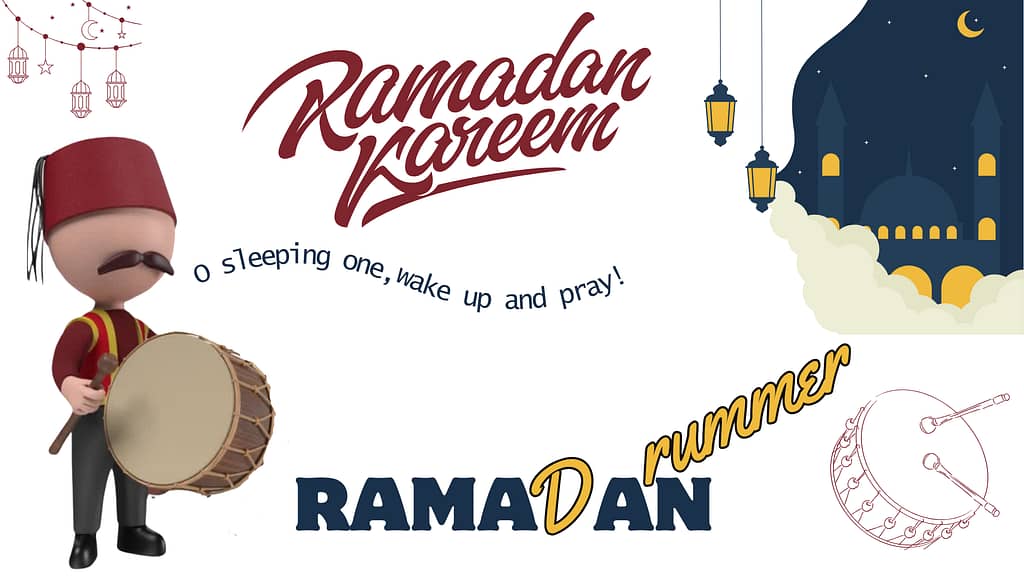1.Introduction of Ramadan drummer
In the tranquil hours before dawn, a rhythmic melody pierces the silence, echoing through the winding streets, it is the sound of the Ramadan drummer, a cherished tradition that heralds the arrival of Sehri, the pre-dawn meal before the day’s fasting begins.
in Arabic, The Ramadan drummer, known as the “Sahar Khwan” or “Musah Arati” they play a vital role in communities across the Muslim world particularly in the Middle East, North Africa, and parts of Asia.
Ramadan drummer armed with a drum or a small percussion instrument, roam the streets during the predawn hours, serving as a human alarm clock awakening the faithful for their pre-fasting meal and prayers.
In this article, we explore the rich history, significance, challenges, and future of the Ramadan drummer.

2.History and Tradition of Ramadan Drumming
Origin of Ramadan Drumming/Ramadan drummer
For centuries, the Ramadan drummer has been an integral part of the cultural tapestry of Muslim societies, passing down their craft from one generation to the next.
While the exact origin of the Ramadan drummer tradition may vary across different cultures and regions, it is believed to have originated centuries ago as a means of waking up the faithful for Suhoor (the pre-dawn meal) during the month of Ramadan.
One theory suggests that the practice of using drums to awaken people for Suhoor dates back to the early days of Islam, when communities did not have access to modern timekeeping devices.
In the absence of alarm clocks or electronic notifications, drummers would roam the streets before dawn, beating drums and chanting verses from the Quran to alert Muslims to the approaching time for Suhoor and Fajr (the dawn prayer).
Cultural Significance
The cultural significance of the Ramadan drummer varies across different regions and communities within the Muslim world. This tradition has been passed down through generations, creating a sense of continuity and cultural identity. In many regions, the Ramadan drummer is seen as a symbol of cultural heritage. In some communities, competitions or festivals celebrating Ramadan drumming are held, further emphasizing its cultural importance.
3.The Role of the Ramadan Drummer
The Ramadan drummer plays a pivotal role in community engagement during the holy month. Below are the duties of Ramadan drummer that they perform during Ramadan
Duties of the Ramadan Drummer
Waking Up the Community:
One of the primary responsibilities of the Ramadan drummer is to wake up the community before dawn for Suhoor, the pre-fast meal. Traditionally, they roam the streets of neighborhoods, tapping on a drum or using other percussion instruments while chanting religious verses and calling out phrases like “Wake up, wake up, O sleeping one, wake up and pray.”
Spreading Blessings:
During Ramadan, having the Ramadan drummer around is like spreading blessings throughout the community. Their rhythmic beats and soothing chants create a beautiful, spiritual vibe, reminding everyone of the holiness of the month and encouraging us all to embrace its rituals with love and dedication.
Community Connection
Besides waking us up, Ramadan drummers also bring us closer together as a community. They’re familiar faces in our neighborhoods, known not just for their drumming skills but also for their friendly chats and warm interactions with everyone they meet.
Timing of the Ramadan Drummer
The timing of the Ramadan drummer’s rounds is crucial, as it coincides with specific periods of the night during Ramadan:
- Pre-Dawn: Before Sunrise: The Ramadan drummer usually starts their rounds just before Fajr, the dawn prayer that signals the start of fasting. They keep going until right before dawn, making sure everyone’s up for Suhoor, the pre-dawn meal.
- Evening: In some places, like parts of the Arabian Gulf region, you might also hear the Ramadan drummer in the evening before Iftar, the meal to break the fast. It’s not as common as the morning rounds, but it’s a special tradition in some communities.”
4.Challenges Faced by Ramadan Drummers
Ramadan drummers, while playing an essential cultural role, face some challenges:
- Regulatory Restrictions: In some countries or communities, authorities impose regulations on the hours during which drumming is permitted. This may limit the drummer’s ability to fulfill their traditional role or require them to obtain permits, adding bureaucratic hurdles.
- Noise Regulations: noise regulations in cities can restrict the volume and timing of drumming. This can diminish the effectiveness of the drummer’s call to wake for suhoor, especially in densely populated areas where residents may be disturbed by the noise.
- Changing Lifestyles: Modern lifestyles, with the prevalence of alarm clocks and digital devices, have reduced the reliance on traditional methods of timekeeping such as drumming.
- Diminishing Interest: Younger generations may show less interest in becoming Ramadan drummers due to the demanding nature of the role and the availability of alternative career paths.
- Economic Challenges: Ramadan drummers depend on community donations for their services. Economic challenges or shifts in community dynamics can impact their income, making it hard for them to support themselves and their families solely through this tradition
- Health and Safety Concerns: Drumming throughout the night during Ramadan can take a toll on the drummer’s physical health, leading to fatigue and exhaustion. Additionally, drummers may face safety risks while moving through neighborhoods in the dark or navigating uneven terrain.
5.Controversies Surrounding Ramadan Drumming
Even though Ramadan drumming holds a special place in our culture, it’s not without its share of controversies. Some folks worry about the noise being a bother, especially in cities. This has sparked debates about whether drumming during Ramadan is really needed or suitable in urban areas. Plus, there have been cases where folks from outside our community have tried to join in on the tradition without really getting what it’s all about spiritually and culturally.
6.Celebrating Ramadan without Ramadan drummer
Many communities are finding new ways to celebrate Ramadan without relying on drumming. Instead of waking up to drumbeats, some use digital reminders or quieter ways to mark the holy month. These creative ideas show how Islamic traditions can adapt to modern life.”
7.Keeping the spirit of Ramadan drumming alive
We are trying hard to maintain the tradition of drumming in Ramadan through educational and cultural awareness campaigns. We are working to convey the importance of drumming in Ramadan to both Muslims and non-Muslims. Let’s keep alive the beloved tradition of Ramadan drumming and honor the role of the Ramadan drummer to enrich our spiritual experience during this holy month. Ramazan Mubarak.
Ramadan drumming according to prominent muftis
“Let’s talk about what Muslim scholars think about Ramadan drumming. Some important Muftis have shared their views:
Mufti Taqi Usmani says Ramadan drumming is okay as long as it doesn’t go against Islamic rules or local noise laws. According to mufti Taqi Usmani it’s important to think about the community’s well-being and keep peace while doing this tradition.
Mufti Muhammad ibn Adam al-Kawthari, from Britain, says we should find a balance with Ramadan drumming. He thinks drumming can remind people about the pre-dawn meal during Ramadan, but it should be done in a way that doesn’t bother others.
Mufti Menk, who is well-known from Zimbabwe, believes Ramadan drumming helps build community spirit and reminds people to wake up for the pre-dawn meal and prayers. He said it’s important to respect local customs while following Islamic rules.”

Is Ramadan drumming practiced in every Muslim-majority country?
While Ramadan drumming is prevalent in many Muslim-majority countries, its practice varies depending on cultural and regional differences.
Is Ramadan drumming only performed by Muslims?
While Ramadan drumming has its roots in Islamic tradition, there have been instances of non-Muslim communities adopting the practice, sometimes leading to controversies over cultural appropriation.
Are there any regulations regarding Ramadan drumming?
Yes, some regions have regulations in place to control noise levels during Ramadan, which can impact the practice of drumming in public spaces.
How can communities celebrate Ramadan without relying on drumming?
Communities can explore alternative practices such as digital wake-up calls, community-led events, and educational programs to honor Ramadan in meaningful ways.
What measures are being taken to preserve the tradition of Ramadan drumming?
Efforts such as educational initiatives, cultural awareness programs, and promoting dialogue between communities are underway to preserve and promote the tradition of Ramadan drumming.

